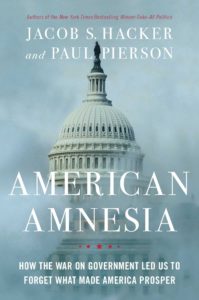Every time there is an election coming around, we get to hear the calls for minimum government and maximum governance. But is maximum governance possible with minimum government? That is the question that American Amnesia by Hacker and Pierson puts to its readers. A beacon of capitalism and free markets, America did not become what it is because of its capitalist values alone, is the author’s argument. Chapter by chapter, function by function, the authors cite and show you that America’s success in the 20th century is a result of government intervention and a successful implementation of Mixed Economy: a balance of public and private enterprise.
Jacob S. Hacker is the Stanley B. Resor Professor of Political Science at Yale University. He has appeared recently on The NewsHour, MSNBC, All Things Considered, and Marketplace.
Paul Pierson is Professor of Political Science and holder of the Avice Saint Chair of Public Policy at the University of California at Berkeley. His commentary has appeared in The New York Times Magazine, The Washington Post, and The New Republic.
 American Amnesia: How the War on Government Led Us to Forget What Made America Prosper
American Amnesia: How the War on Government Led Us to Forget What Made America Prosper
Author: Jacob S. Hacker and Paul Pierson
Pages: 464
Publisher: Simon & Schuster (March 29, 2016)
ISBN-10: 1451667825, 978-1451667820
America’s current success and its current position as richest country is not a result of hardcore capitalism. It is the result of successive governments that encouraged free enterprise and also intervened to implement restrictions necessary to make private businesses to consider and think of common good along with profits. The author argue that if left to private businesses and markets, there won’t be any willing regulators – as they will all be motivated by immediate financial gains – to think of common good and lead the country more into chaos than a well oiled machine that it is now.
But this important aspect of government is now forgotten by the people who readily take up the cudgels and join the war cries against a big government machinery. He points out that the birth of capitalism was not synonymous with mass prosperity, and prosperity remained elusive until well into the nineteenth century.
In the first part of the book, The Rise of the Mixed Economy, Hacker and Pierson focus on the role the US government played to make the country what it is today. They cite the various instances and events where public funding and spending single-handedly changed the course of country’s progress. From cleaning water and funding vaccine research to quell infant mortality, to health care reforms for the masses and the aged, it was the government’s policy thrust that made the world envy America.
The authors give examples and cite success of government interventions in every sphere and reiterate how, if left to private enterprise, these things could not be achievable. They discuss the role of an ideal government in any country. They show us how it is almost impossible to provide the basic framework that businesses need to function: infrastructure to facilitate, rule of law, protection from external attacks, and so on. The authors also point out that there are almost no rich, successful countries with small governments.
If the first part reminds the readers of the value of Mixed Economy and a strain of socialism necessary in governments, the second part, The Crisis of the Mixed Economy, concentrates on how things changed in the last few decades in America.
Through various discussions in newspapers, books, and speeches, the authors show us how the public discourse changed toward the end of the 20th century. Government as the drag on economy was the message echoed in every discourse. The democratic party moved more toward the conservative views and the conservatives moved further right. The whole country shifted to a more conservative opinion and took up the Ayn Rand philosophy.
The authors quote recent studies that show how the rich see public welfare policies as a drain on country’s wealth and the increasing government support to this view. This government shift, the authors quote, is evident from another study that shows us that most policy changes adopted had support from the rich and the industry associations, while none supported by the middle class went through.
Mass prosperity and productivity is the only solution to make a country rich, otherwise what you have a 2 percent population, bigger than the government, running a proxy government, with no intention of doing common good, unless they are paid for it.
The book is not an argument for Democrats of against Republicans or conservatives. It is more of an observation of how the onslaught on the idea of Mixed Economy hurtled US to its current state. The current state is not bad. But it is so because it stands on the pillars of a Mixed Economy principles. The authors meticulously make each argument by putting forward studies, facts, and data, and yet do this in a very conversational tone. In the midst of a cacophony for free markets and a march against big government, American Amnesia is an exploration of past public spending successes as well as a reminder to those in the government, of their responsibilities toward the masses.